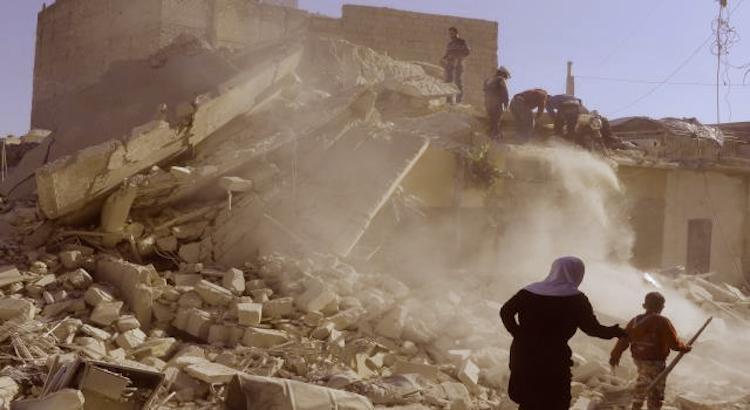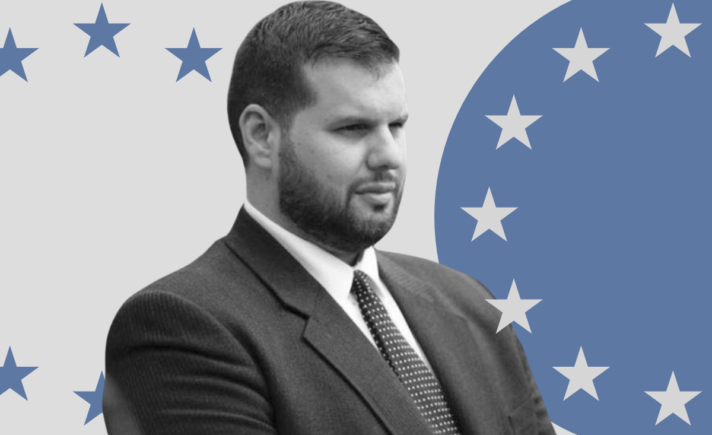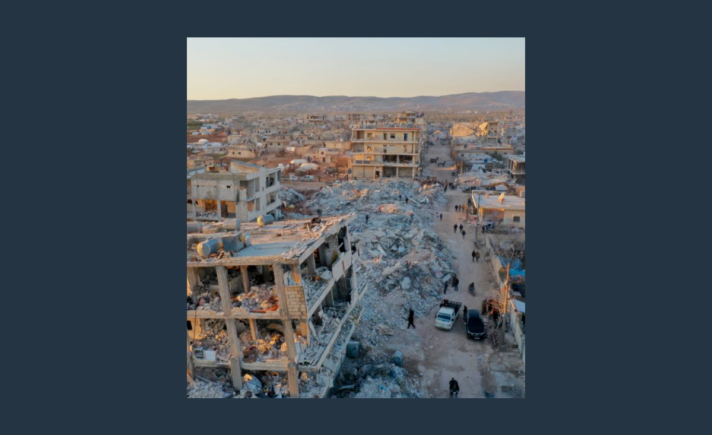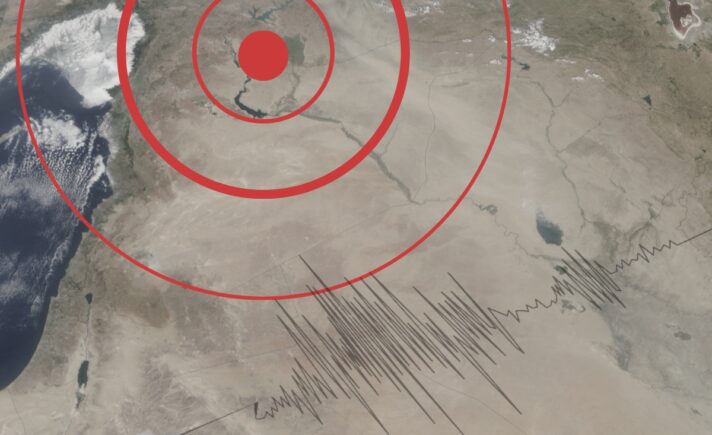It isn’t true that victory for the Assad regime is an inescapable certainty. It has never been true since the start of the revolution. The evidence for this is the hundreds of thousands of demonstrators who held fast in the face of death for many months in 2011; as well as hundreds of subsequent military battles, such as the battle for Daraa City last summer, which demonstrated how the regime would not have been able to re-occupy the Hawran region were it not for agreement between the United States and Jordan, and the contribution of these two, along with Israel and the Gulf states, to nipping the revolution in the bud, in exchange for understandings with Russia that no one deigned to bother explaining to Syrians themselves, the luckless victims of all such agreements.
Today, Idlib too speaks volumes, with the battle for the town of Kafr Nabuda on the province’s southwestern fringes telling us the same thing. The regime that has succeeded in taking over so much rebel-held territory with such speed has now spent a full month unable to break past a small town in the plains of Hama’s northern countryside, simply because this time there exists the will to fight on the part of the rebel factions, and a bit of ammunition and weaponry thrown in by their international backers.
The regime’s previous victories haven’t been possible because its opponents are farmers and dentists, as Barack Obama said in justification of his refusal to rein in the regime’s brutal killing machine. They’ve been possible because the regime commits atrocities on a scale and frequency unprecedented since the Second World War; atrocities executed with industrial efficiency, as Zygmunt Bauman said of the Nazi’s Holocaust machinery.
Nor has the regime succeeded in the past due to any military or political genius guiding its actions, but rather because international and regional circumstances have permitted it to practice unlimited barbarism and undeterred violence. The point of saying this is not self-consolation, or a desire to cast blame on others in self-victimizing fashion. Indeed, the regime’s victories are also attributable to the internecine conflicts between the Syrian opposition’s political forces, and their failure at every level; and to the inept leadership of most armed factions, and their dependence on outsiders, and lust for power, and widespread crimes and violations of their own. Still, at every turn one finds a thousand indicators that the regime is too weak to win, and too worn-out to rebuild itself, and that it and its allies would be incapable of military victory were it not for the international community permitting them to slaughter Syrians, and keep their extermination possible at any moment. This, indeed, is a cornerstone of Syrians’ relationship with the world.
We say with the world, and not merely with the regime, because Syrians see with their own eyes that the entire world is a partner to this annihilation, or consents to it, including all the officials who put out angry statements after each massacre, while at the same time appearing as witnesses in the background, declaring a truth about which nobody can do anything, making it all the more oppressive.
At the heart of this annihilation are the regime’s chemical weapons, the use of which Western leaders invariably warn will be met with an “appropriate response” next time. Syrians have by now seen this “appropriate response” on numerous occasions, from the 2013 chemical deal to the theatrical strikes following the massacres in Khan Shaykhun and Douma. Today, the chemical issue has become a media farce, with Russia repeating its talk from last year of “provocations” being prepared by “terrorists in partnership with the White Helmets” in Idlib. Syrians know full well the meaning of these words: they are a direct threat of the regime using chemical weapons once again.
The atrocities arising from the regime’s and Russia’s systematic bombardment are intended to play a role beyond the mere course of the battle on the ground. This has been evident in the current campaign, which has brought about the displacement of the residents of Hama’s northern and western provinces along with Idlib’s southern and western ones, leaving these territories practically empty of inhabitants; deserts of cement dust kicked up by barrel bombs. Should the regime turn out to be able to invade and seize control of these areas in the coming period, the displacement of their residents will make things easier for it, since it will have no need to keep in check people who have mastered the art of rebelling against it for many years. On the other hand, if international power balances and the determination of rebel fighters prevent the regime from advancing, it will nonetheless have left these areas uninhabitable for a long time to come, and have made of them an example etched into Syrians’ memories—yet another instance of the regime’s favorite slogan, “Assad or we burn the country.”
Given the images of the children killed in Idlib, it’s not for the sake of pelting accusations at random that we say everyone is a party to this massacre: the diplomats who laugh derisively at requests for international protection; the leaders of Syria’s neighbor states who see the bloodied bodies of Syrians as a path to greater regional influence or political gains; the states which viewed Syrians as “threats to national security,” prompting them to assist in their killing on the pretext of self-defense; the warlords and militia leaders whose enthusiasm for killing us never wanes, and those who fund them with equal enthusiasm as a means of dueling with their competitors; all the international policies that see nothing to concern them in our slaughter except “security requirements,” and the “War on Terror,” and “stemming the influx of refugees;” the deals and arrangements reached in the dark, the bloody costs of which are paid in broad daylight.
While marketplaces, hospitals, schools, and civil defense centers are targeted by the party with overwhelming military superiority and an absolute monopoly over the skies, world officials have no compunction speaking of “exchanges of fire” and the “mutual violence” that must be stopped in order to protect civilians in Idlib. This at a time of an unceasing stream of horrifying images and videos coming out of the area, the briefest glance at which suffices to tell one that what’s happening is no “exchange of fire” but rather the dictionary definition of a massacre, with no doubt whatsoever as to the identity of its perpetrators.
And yet, even after all this, the regime and its allies remain incapable of attaining their desired victory. This is because the latter doesn’t end at settling matters militarily, which the regime does appear capable of if the “friends” and “guarantors” of the opposition keep to their current course. Rather, the victory to which the regime aspires consists of no less than the spreading of “politics” through the corpse of the regime casting its weight across the country. This “politics” requires the regime’s opponents not to disappear, but instead to be involved themselves in accordance with the Russian vision. It is this that does not look to be possible without nominal concessions from the regime; concessions which the regime’s make-up doesn’t allow it to offer up.
Russia seeks to drag the regime’s opponents to the negotiating table bound in chains, and the political and military bodies representing these opponents may no longer have the energy or ability to resist after all that has happened. Yet the recent battle of Kafr Nabuda demonstrates that they do in fact have this ability, if and when a bare minimum of support and assistance is made available. Since the agreements made by the “guarantors” are secret, with details unknown until they’re implemented, Idlib and its people have no alternative left but to present their bare flesh as a witness to the way the international community works to turn a rotten corpse into an ostensible political regime by the force of fighter jets and chemical weapons.





